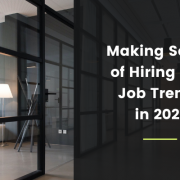Why So Many Are Voluntarily Leaving Their Jobs, and Why That’s a Good Thing
Leaving Your Job

We’ve heard about mass layoffs and businesses closing, but another, more uplifting trend is happening during the pandemic.
People are voluntarily leaving their jobs.
Despite the uncertainty—economic or otherwise—people are still taking risks to find something better for themselves.
The Numbers
How many people are making the change? Depending on the survey and details about respondents, anywhere from one-quarter to one-half of employees plan on leaving their job once the pandemic is over. Millennials seem to make up a large portion of those dealing with frustration and burnout as well as working mothers.
Why Are They Leaving?
People don’t leave the work; they leave the people—their bosses, coworkers, and the company culture.
Sifting through the many reasons for leaving their jobs that I’ve heard and read about, it seems to boil down to a lack of our basic needs for flourishing. Psychologists have studied the innate needs we all have to motivate ourselves. No, not roof, water, and shelter—those are necessary to live. These traits, described as the “self-determination theory” by Edward Deci and Richard Ryan, are what people require to feel good about what they’re doing and how they’re spending their time: autonomy, relatedness, and competence.
And managers and companies are failing to offer these to their employees during the pandemic—a time when they matter more than normal since a majority of outlets have been taken away (like social events, barbecues with families, drinks with friends, hugs, fill in whatever thing you’re missing).
How have companies cheated their employees of these three needs?
Autonomy
Autonomy can take lots of different forms at work.
Since companies, like many of us, went into survival mode, many employees had to take on tasks that quickly became dull and tedious, especially without the social aspects of work to take a break (who knew we’d miss that break room so much?). But innovation and creation can still happen away from an office, and employees are looking for a way to feel engaged with their work.
Bad managerial practices are also being seen in a new light. Any micromanaging happening virtually seems especially invasive and unacceptable. Putting in extra hours after 5 or 6 p.m. starts to become a problem. People want to feel in charge of their work projects and hours, and when they don’t, they leave.
In addition, employees, when forced to work from home, found that certain aspects of remote work were actually nice (no commute, no constant interruptions, etc.). Companies can offer flexible schedules going forward, like working from home at least once or twice a week.
It all can come down to dependency. Workers are currently left to wonder when offices will open, how to conduct virtual meetings, and what is expected from them as they work from home. Many people don’t feel listened to—or even know of a way to share their frustrations in a constructive way. This sense of complete uncertainty is driving people away from toxic companies.
Relatedness
People feel isolated while in self-isolation (go figure). But as we’ve seen over the past year, connection and collaboration can happen in virtual settings, though it won’t happen organically. Managers can set up some ways to socialize among and within departments. While Zoom fatigue is real, there are ways managers can set everyone up for an enjoyable time.
The same goes with collaboration. Just because we’re all working from home doesn’t mean we should interact with our teammates on projects.
Competence
A sense of competence and challenge is a biggie. The learning of new skills has stagnated during the pandemic. Everyone switched to survival mode, but the need for gaining new skills, especially relating to technology, and adding to current ones became even more apparent.
Without the office and all of its distractions and tangents, workers are starting to rethink their skill sets too. Without learning new skills and being presented with new challenges, people don’t see a future at their company or job and will search for something that does meet the requirements.
Values Are Changing
It’s not just that working at some companies is now somewhere between off-putting and unbearable. In times of stress and strife, people are looking inward. We don’t know what tomorrow will bring, and most of us are way more aware of that now than two years ago. We see the preciousness of life and understand that how we spend our days is how we spend our lives.
With this introspection comes a reordering of our values. Some people now want to live closer to family or the beach. Some want to feel more challenged and appreciated at work. Others want to earn a fair and livable wage. And some want to make a difference.
A lot of people are seeing what matters and want to achieve a better work-life balance.
Why Is This a Good Thing?
Why is it good that people are leaving toxic work environments? It’s good for so many reasons!
Companies are starting to learn that how they treat employees matters. The ones that consider the whole person they hired—the family they need to look after, the hobbies they want to pursue, the curiosity that is bubbling underneath, their innate psychological needs—are the ones that will survive and thrive in the future.
This also means that more people are taking care of themselves and the people they love. With higher self-esteem comes great enjoyment, satisfaction, pay, passion, and grit. And that’s such a good thing!
Photo by Micha? Parzuchowski on Unsplash

I’m Stacey Lane: Career Coach | Transition & Career Strategist | Personal Brand Specialist
I help individuals with unique backgrounds find their perfect fit and effectively market themselves so they find work that is as interesting as they are.
Contact me to get started!




